Welcome to our column, Russia Update, where we will be closely following day-to-day developments in Russia, including the Russian government’s foreign and domestic policies.
The previous issue is here.
UPDATES BELOW
Russia This Week:
– What Happened to the Slow-Moving Coup?
– Can We Be Satisfied with the Theory That Kadyrov Killed Nemtsov?
– All the Strange Things Going On in Moscow
– Remembering Boris Nemtsov, Insider and Outsider (1959-2015)
Special features:
– Alexey Navalny On the Murder of Boris Nemtsov
– Theories about Possible Perpetrators of the Murder of Boris Nemtsov
– Novaya Gazeta Releases Sensational Kremlin Memo
Please help The Interpreter to continue providing this valuable information service by making a donation towards our costsâ€.
As we reported earlier, neo-Nazi Preston Wiggington is organizing the lecture of Russian ultranationalist Aleksandr Dugin at a meeting on the campus of Texas A&M University. Some Ukrainian activists are already protesting to university authorities. There has been increased scrutiny on the speeches Dugan has made on social media (on VKontakte, the Russian social media network, on Facebook, and in videos uploaded to YouTube), although digging through the voluminous amounts of speeches and comments he has posted is daunting.
Last year, as we reported, Dugin was fired from Moscow State University after massive petitions due to his violent calls for Russians and Russian-speakers in Ukraine to take up arms against the government in Kiev, and for his open recruitment of Russian volunteers for the Moscow-backed armed movement. He has also infamously called to kill Ukrainians.
A videotaped talk show on May 6, 2014 with the pro-Moscow ANNA News was widely distributed at the time. We reviewed and reported the video at the time and uploaded a copy of the video.
Later, the video was removed from YouTube and other social media sites including VKontakte.
But the video can still be viewed here on Tomsk.FM. Throughout the 23:49 minute video, Dugin calls on Russians and others in the southeast of Ukraine to take up arms and fight the Kiev government to survive; he says that Ukraine has been taken over by bad people.
At 17:59, he says “Such people must be killed, killed, killed.”
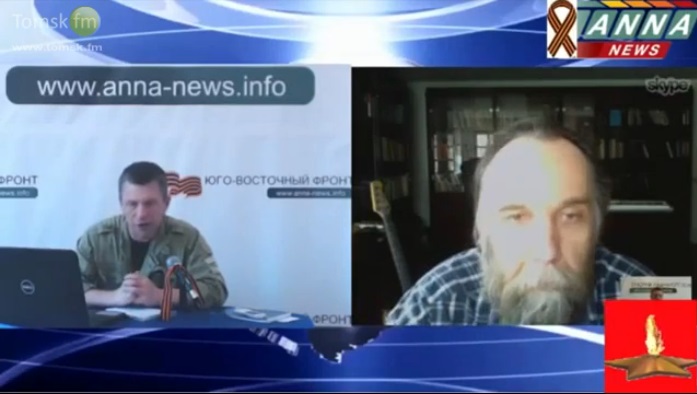
In the interview — which is really more like a monologue — Dugin is responding to the tragic deaths of 48 people on May 2 in the Ukrainian city of Odessa. He gives a tendentious version of these events to imply that Ukrainian activists deliberately burned Russians alive in an act of “genocide.” Wikipedia’s essay gives a more credible and even-handed account, explaining that both pro-Russian activists and Ukrainian nationalists were to blame for violence during and following a soccer fans’ parade.
Pro-Russians shot dead six Ukrainian nationalists, some during the parade and some from atop the Trade Union Building; police did not control the crowd.
Then Ukrainian nationalists stormed an impromptu tent display in
front of the Trade Unions Building made by the Russian “Anti-Maidan”
activists. The pro-Russian activists retreated into the Trade Union
Building, a move they had planned days before the soccer clashes.
Both sides threw Molotov cocktails, and the pro-Russians fired on
the crowd from atop the building. With the doors barricaded on the
ground floor, the pro-Russian activists climbed to higher floors and
ultimately 42 died, many of carbon dioxide poisoning from the fire,
while hundreds escaped. Some Ukrainian nationalists beat Russians
escaping; some Ukrainian nationalists helped their enemies to escape
using makeshift ladders fashioned from the toppled Anti-Maidan poster
scaffolding. Fireman took an hour to come, and police arrested some
perpetrators but let others go. To this day, local and national
authorities in Ukraine have not completed investigations into the deaths.
The response of Russian state media was to characterize the clashes
as a “mass crime against humanity” on the part of Ukrainians and to
open up a criminal case. Ukrainian leaders in Kiev blamed local police
and politicians for not controlling the crowds, but many also sanctioned
the fighting with the argument that they had to prevent Odessa from
being taken over by the Russian-backed separatists as Donetsk and many
other towns had been in April.
Dugin said that while he ostensibly did not want to escalate the war, he believed he had to call for an uprising after Odessa.
The Interpreter has translated the relevant excerpt:
Yes, now in Odessa, Kherson, Nikolayev, Zaporozhe, Dnepropetrovsk
we are retreating. We are retreated from Kharkiv, we are retreating. But
May 2, that was Moscow. That was our Moscow. That’s it. Behind our back
is Moscow. We can’t retreat further. If we retreat, they will just go
on killing, they will kill everyone.Thus life in the southeast
of Ukraine today depends on the amount of combat weapons, the units of
arms in the hands of decent people. Ukrainians, Russians, Jews, it’s not
important people of any ethnicity, it doesn’t matter, people of any
political views, communists, nationalists, patriots, advocates of
federalization with Ukraine, advocates of federalization with Moscow,
advocates of independence, this can only be decided if there will be
people.Those perished heroes in the Trade Union building made
their decision. Those fallen heroes in the Trade Unions Building, they
made their choice. They died for the sake of the freedom of the
southeast of Ukraine from the neo-Nazi Kiev scum. I think to be a
Ukrainian after this — you know, I myself am Ukrainian, I have
Ukrainian blood, my ancestors are from Poltava. I am ashamed I am simply
ashamed of that small but still significant part of my blood. And I
want that blood to be cleansed by the blood of the scum of the Kiev
Junta. In fact I can’t bear within myself that Ukrainian blood until I
see punished the mongrels who perpetrated the lawlessness of May 2nd.
This is serious. This is the voice of blood. I am forced to take these
things into account. I believe that those vermin do not have any right
in some western Ukraine, in the government in Kiev — I understand that
that the southeast will never be in that mongrel state. These people
have no right to control even western Ukraine.And if on the
earth, everything we see still carries on, no one can sleep easily.
Therefore only normal people should govern this wonderful — this
one-time wonderful — Ukraininan people, that wonderful, amazing country
to which everything connects us. As long as there are vermin in Kiev, a
Russian person, a person born in Kievan Rus’ — those are our roots —
cannot live in peace. Either it has to be wiped from the face of the
earth and built anew or people must come to their senses.I think
in Ukraine a total uprising is needed, throughout all its territory, in
all its regions, a popular uprising, an armed uprising against the
junta, and not only in the southeast. Or otherwise the same thing could
happen in Uzhgorod, and the Ruthenians have already occupied the first
Ruthenian building where they have gathered to resolve their problems
entirely in peace. The same hangs over the Hungarians who are in
Trans-Carpathian Rus. Over Russians — everyone, over Ukrainians — even
Ukrainians. Who did he attack? Who did Sanya Bilyi mock? The very same
Ukrainians as he himself was, they were not foreigners. And what did he
start to wreck? They stopped him. But now mnore terrible people have
come. We didn’t see the sabotage of Sanya Biliy. He just grabbed some
people by the tie and dragged them, it a horrible scene.But what
happened May 2nd went beyond all bounds. I think such people have to be
killed, killed, killed. There can be no other discussion about it. As a
professor, this is what I believe.
Oleksandr Muzychko,
nicknamed “Sashko Bilyi” (called a more Russified “Sanya Bilyi” here by
Dugin) was an ultranationalist actvist in Right Sector and UNA-UNSO who
was alleged to kill 20 Russians during the First Chechen War, who vowed
to kill “communists, Jews and Russians for as long as blood flows in my
veins.” In February 2014, he attacked a prosecutor in Rovno and
threatened to “kill like a dog” Interior Minister Aven Avakov. On March
14, 2014, Russia issued a warrant against Bilyi for war atrocities. On
March 24, he died in a gun battle with Ukrainian police who had
attempted to detain him.
Dugin’s implication that it was only the May 2 Odessa fire that drove him to
call for an uprising rings hollow when we review his earlier speeches.
As Paul Goble reported,
in April 2014, in a Skype conversation Dugan had with Yekaterina Gubareva, the
wife of Russian-backed separatist Pavel Gubarev, the “people’s governor
of Donetsk” (who at that time was in Kiev’s custody for violent uprising
in the city), we can see that he was calling for armed insurrection even
then.
As Goble wrote then:
Aleksandr Dugin, a Eurasianist who is close to the Kremlin, has told
ethnic Russians in Ukraine that they must not cooperate with Kyiv in any
way, that they must be ready to “act radically,” even to the point of
sparking a civil war in that country, and that Moscow will support them
because it supports “the independence of South-East Ukraine.”
The video published by By24 can still be viewed:
— Catherine A. Fitzpatrick
Aleksandr Dugin, the ultranationalist Russian idealogue and advocate of Eurasianism will be taking part in a seminar at Texas A&M University via remote, an organizer said on his Facebook events page.
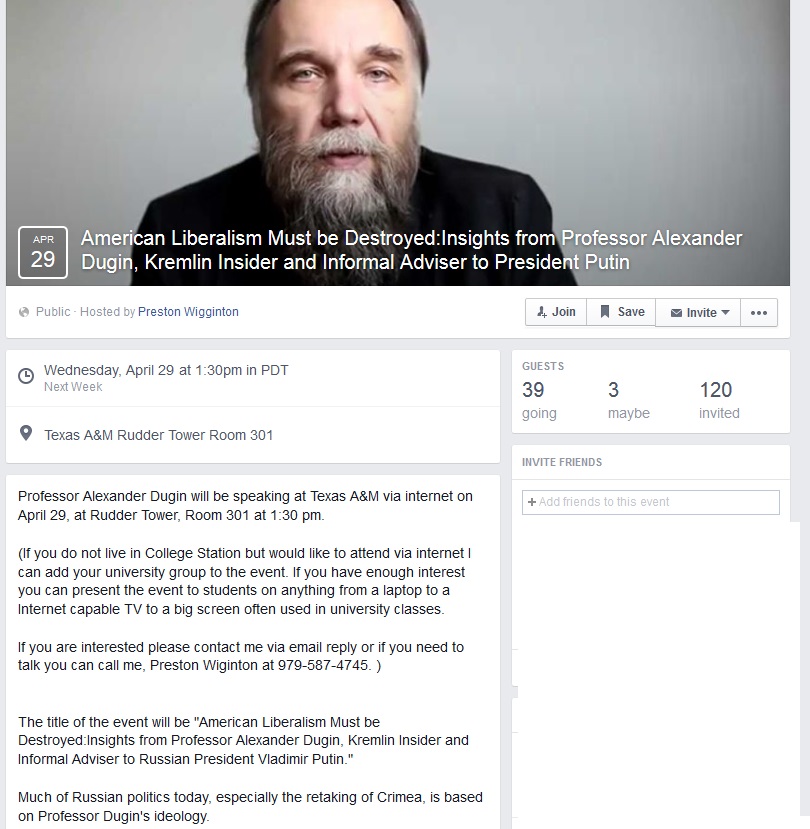
The title of his lecture is “American Liberalism Must Be Destroyed: Insights from Professor Alexander Dugin, Kremlin Insider and Informal Adviser to Russian President Vladimir Putin,” — although so far, only 39 have said they were going.
The organizer is Preston Wigginton who describes himself on Facebook as a business owner who studied at Texas A&M.
When the notice was first posted on Facebook, it seemed to attract mainly critics of liberals in the US and supporters of President Vladimir Putin, but as news got out about the event, activists have showed up to the thread to complain about the sponsorship of Dugin, notorious for calling for the killing of Ukrainians..
As a number of commenters expressed concern that Texas A&M was sponsoring Dugin, Wigginton noted that it wasn’t necessarily the college but just the use of public space available at the college.
We note that Dugin is on the US sanctions list for his role in recruiting fighters for the war in the Donbass. Dugin as actively promoted the ideology of “Novorossiya,” the aspirational realm of
Russians and Russian-speakers outside of Russia and occupation of
Crimea, as well as the separation of the self-proclaimed “Donetsk and Lugansk People’s Republics” from Ukrainian territory in some form.
It’s not likely that Dugin is serving as an adivsor to Putin nowadays, however, since last year, through his role as chair of the board of Moscow State University, where Dugin taught in the philosophy department, Putin had him dismissed — possibly he had “gone too far.” His contract was not renewed. But Dugin continues to appear at events sponsored by the Russian Orthodox Church and various other pro-government institutions.
On his Facebook page, Wigginton expresses views many would find racist against blacks and others, claims that “Sharia law is coming to Texas,” a conservative conspiracy theory debunked by Snopes. Wigginton also advocates corporal punishment for children. A selfie of Wigginton flexing his muscles in front of the men’s urinals, like ‘Popeye the Sailor Man,’ perhaps sums up the scene best.

As it happens, Wigginton is something of a far-right conference entrepreneur. The Anti-Defamation League reports that he has sponsored Jared Taylor, the white supremacist who recently took part in the gathering of European and Russian conservatives in St. Petersburg, about which our syndicated columnists Paul Goble and Anton Shekhovtsov have written. Wigginton has sponsored Nick Griffin, who was then the head of the ultra-right British National Party (BNP). ADL writes:
In addition to living in Texas, Wigginton has spent a lot of time in
Russia. In 2007, he addressed thousands of Russian nationalists at
the Russian March, which promoted Russian nationalism and attacked
non-white immigration. The participants gave Nazi salutes at the
march and shouted, “White power.” Shortly after this event Wigginton
forged ties with Alexander Belov, an anti-Semitic, anti-immigrant
nationalist in Russia. In addition, that year Wigginton spoke at
an annual memorial rally in Sweden in honor of a 17-year-old neo-Nazi
who was killed by non-Swedes in 2000.
As we reported last week, Belov (whose real last name is Potkin) was recently arrested on money-laundering charges and has claimed that Russian secret police wanted him to commit terrorist acts in Ukraine, and when he refused, they arrested him.
— Catherine A. Fitzpatrick
Translation: The leader of the RPR-PARNAS party in Novosibirsk reported that his wife had received death threats.
According to news.ru, Yegor Savin said unknown persons threatened reprisals against his wife, and later tried to burn his car.
While he was out of town, his wife receive a number of threatening phone calls from anonymous individuals who warned her that if her husband didn’t stop his political activity, she would be murdered, Taiga.info reported.
His wife was able to tape the calls and he is making an appeal to the Investigative Committee to examine the case.
When Savin returned home on April 22, he discovered that someone had tried to torch his car, he told Sibinfo.
He connects these threats with his involvement in opposition activity. As News.ru reports (translation by The Interpreter):
“After the murder of Boris Nemtsov, all these phone calls are perceived as a threat to me and my family,” said Savin. He added that he intends to demand law-enforcers to guarantee the security of his family until the elections to representative bodies in Novosibirsk Region this coming fall.
Furthermore, Savin published his statement on social media. “If anything happens to my family ,me, or my property, the responsibility will lie on the law-enforcement bodies of the Nosibirsk Region and the governor personally.”
On April 16, two other party members, Aleksei Tabalov, head of the Chelyabinsk branch of the party, and Sergei Mikhailov, head of the Altai branch, were detained and questioned at Domodedovo Airport by officers of the Anti-Extremism Center.
The next day opposition leader Alexey Navalny announced an election coalition formed by RPR-PARNAS and the Party of Progress, which the Civic Initiative and Democratic Party joined. The groups hope to field liberal candidates in the 2015 regional elections and the 2016 State Duma elections in 2016.
Businessman Mikhail Khodorkovsky, former head of YUKOS and founder of the civic movement Open Movement, said his organization supported the coalition, but as a civic organization as distinct from a party, they would not nominate candidates.
As the parties announced the new coalition, another RPR-PARNAS activist, Natalya Peleina, was searched and interrogated on charges of “organizing and financing mass disorders” at the May 6, 2012 anti-Putin demonstrations, although she did not participate in them. She was forced to sign a pledge not to leave town pending investigation.
(Note: The Interpreter is a project of the Institute for Modern Russia, funded by Pavel Khodorkovsky, the son of Mikhail Khodorkovsky.)
— Catherine A. Fitzpatrick
Gazprom with monopolizing the gas market in Europe, contrary to EU
regulations.
This decision was long in the coming and needed the current political
climate, where Europeans have grown increasingly alarmed at Russia’s
aggression against Ukraine as well as its encroachments on their own
territories, to be realized.
While designed to deter Russia’s bad behavior, there are concerns
from some it will worsen relations and create more reciprocal actions by
Moscow.
can use gas blackmailing of Europe — which has relied on Russia for
25% of its gas — without then depriving itself of its main
foreign-currency customer willing to pay higher market prices than its
allies and China, it’s new partner.
Even if there were no war in Ukraine, the EU would have good reason
to challenge Gazprom’s monopoly and continue to figure out ways to
reduce its dependency on Russia. This it has been doing through ending
the South Stream project and backing the Trans-Adriatic Pipeline (TAP)
to obtain gas from Azerbaijan and route it to Greece via Albania and the
Adriatic Sea then to Italy and further to Western Europe. To be sure,
Russia has countered with Turkish Stream once again changing the
calculus for prospects of independence from Russia in the Southern
Corridor.
Russia will likely challenge the ruling nonetheless with every argument it can muster.
Russia has three months to respond to the charges, and a lot could
happen then, including a split in the EU regarding the removal of
sanctions against Russia over its aggression against Ukraine.
The question is whether Europe has the stamina to keep both the
sanctions and what the Russians will portray as a
politically-motivated maneuver on the monopoly issue going at once.
— Catherine A. Fitzpatrick
Former prime minister Mikhail Kasyanov, co-chairman of the opposition RPR-PARNAS party, said he is planning to present to members of the US Congress on this Thursday April 23 a list of 8 Russian journalists that he believes should be placed on American sanctions lists, RBC.ru reported.
Kasyanov and Vladimir Kara-Murza, a member of the federal political council of the RPR-PARNAS party, said the group of Russian TV executives and journalists dubbed the “Nemtsov List” had contributed to the climate of incitement and hatred that they believe led to his assassination.
The list includes:
Vladimir Solovyov
Dmitry Kiselyev
Arkady Mamontov
Andrei Karaulov
Konstantin Syomin
Vladimir Kulistikov
Oleg Dobrodeyev
Aleksei Pushkov
Pushkov, chair of the State Duma’s foreign affairs committee and also considered a television journalist, is in fact already on the US sanctions list for his role in unlawfully annexing the Crimea, an act which the US and other Western governments do not recognize and which a majority of members of the UN General Assembly condemned in a resolution last year. Dmitry Kiselyev, the head of the Russian state news network Rossiya Segodnya, is sanctioned in Europe but not yet by the United States.
It will likely be difficult to persuade US Congress members to take any action against these journalists, even those in state media playing a role in war propaganda and disinformation, due to the First Amendment to the US Constitution which provides a high threshold for free speech.
Even without the formality of sanctions, a country is entitled to withhold entry visas to foreigners at its own discretion There is no domestic or international that can trump this fundamental feature of sovereignty.
But in practice, when the US government has banned controversial foreigners such as Tariq Ramadan from entering the US to give lectures or take part in conferences, it finds the individuals only get more attention and become the focus of campaigns to overturn the government decision to ban them.
The First Amendment isn’t unlimited, and there is a concept of “incitement of imminent lawless action,” known popularly as “crying fire in a crowded theater,” under such US Supreme Court decisions as Brandenberg v. Ohio.
In the international arena, in order to prevent the kind of vague and capacious speech controls for which Russian legislation is known, for example, the US has worked to get the concept of “incitement of imminent violence” into any resolutions aimed at controlling speech, such as Resolution 16/18 on tolerance.
In a speech in 2013, former UN High Commissioner for Human Rights Navi Pillay specified the criteria under which a call for imminent violence could be severe enough for suppression — whether or not the speaker is in a position of power; whether the audience was large; and whether the intent was to harm.
Those are the sorts of issues Congressional staff might look at in recommending any visa bans but it’s unlikely.
A recent court ruling in New York City exemplifies the American attitude toward the kind of speech made by some of these Russian journalists.
Yesterday April 21, a
federal judge ordered New York’s Metropolitan Transportation
Authority to display on its buses a controversial ad that refers to
Muslims killing Jews, rejecting the argument that the ad could incite
terrorism or imminent violence.
A Congressional review of these individuals will nevertheless be useful regardless of whether they take action to ban them because they will help better understand how propaganda works and how toxic are its consequences, so that more effective public diplomacy and counter-propaganda, including in foreign broadcasting should be developed.
Kasyanov and Kara-Murza were asked to provide examples, and BBC’s Russian Service covers more of this material.
It’s not just that these figures smeared Nemtsov; they incited hatred of him and contributed to a climate of persecution that the opposition fears made it possible to provoke his assassination.
When Kasyanov and Nemtsov organized the Peace March against the war in Ukraine last year, Kiselyev said on his weekly program that the organizers were inspired by “mud-slinging” and the march was called the “March of Traitors.”
Mamontov was found to have said, “I wonder which American parties pay more? Who paid Nemtsov and other liberals?” he said on the Spetsial’ny Korresponent (Special Correspondent) show.
Syomin in the show Agitprop claimed that Nemtsov would have welcomed the invasion of Moscow by Hitler in 1941.
The US has not included Kisilyev in its sanctions list, despite him implying that Russia could reduce the US “to nuclear ash.” But the EU has included Kisilyev for his role in war propaganda, because European media law tends to be more restrictive than the First Amendment.
The journalists in the list were contacted by BBC and weren’t happy with the proposal for sanctioning them. Solovyov objected, “I was friends with Boris. And the very idea of such lists for journalists contradicts the spirit of the Russian Constitution.”
So far, the current suspects arrested in the murder — five Chechens, one of whom served in Chechen President Ruslan Kadyrov’s Interior Ministry troops — have not given any indication that they were incited to hatred by watching Russian TV or even reading Nemtsov’s posts on Facebook with criticism of Kadyrov’s “personal army” and support of the journalists of Charlie Hebdo.
— Catherine A. Fitzpatrick
The murder of Ukrainian journalist Oles Buzyna, shot dead outside his home on April 16, has proved fodder for numerous social-media discussions and speculations and conspiracy web sites.
A story that began to emerge after his death was a claim that Peacekeeper (Mirotvorets), a Ukrainian web site that tracks cases of suspected “pro-Russian terrorists, separatists, mercenaries, war criminals, and murderers” had in fact uploaded his profile two days before his death, and even added his home address and phone number, which had not been previously published before his death.
LiveLeak and many others maintained that the dating of the entries before the murder constituted proof that the website was involved in the murders.
The same claim was made about an entry for Oleh Kalashnikov, a former parliamentary member who had been shot dead the previous day on April 15 as he returned home to his apartment.
But as Peacekeeper explained in a post on their site on April 17, the entire thing was apparently a deliberate hoax — a honey-trap for conspiracy theorists.
The site managers said they had been planning for some time to figure out a way to trip up the numerous Russian conspiricists and propagandists who attacked their project and evidently the tragedy of the deaths provided this for them.
After the news of the deaths broke, they saw a sharp spike in traffic to their site as people began searching for more information about the victims. In fact they didn’t have entries for Buzyna or Kalashnikov. They explained that while Buzyna was pro-Russian and anti-Maidan, they did not find evidence of any violence so they did not include him in their data bases. Evidently they had no entry for Kalashnikov, either, but found his personal information and added it as part of the spoof.
So when the spike in search requests came, they quickly made up a profile for the victims — but back-dated it to April 14. They made up a fictitious character, “Agent 404,” so named for the number used by web developers for pages that are deleted.
They then deleted the pages after they had been read, knowing that they would leave a trail in Google’s web cache.
For extra measure, they planted a fake tweet:
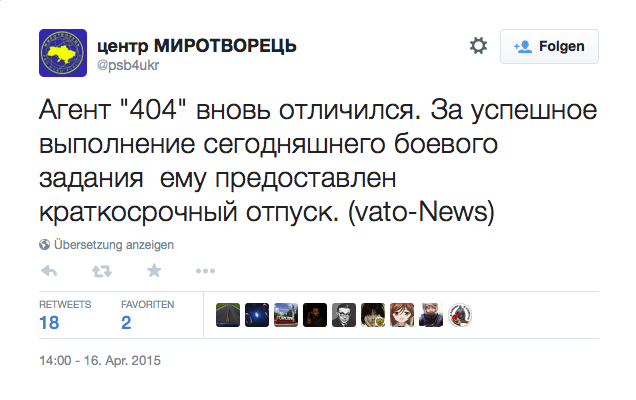
Translation: Agent “404” once again distinguished himself. For fulfillment of today’s combat assignment he is given a brief holiday. (vato-News).
It’s here where the propaganda sites bit hard — Slavyanagrad, a popular pro-Russian separatist site ate up all the clues and dutifully reported them in a post titled, “Murder of Oles Buzina— a Campaign of Intimidation by NATO?” They highlighted the suspiciousness of the entries dated before the murder, and even went further to find a seeming domain trail that showed “NATO.int”.
The website The Peacekeeper is being used as a ‘bulletin board’
for imminent death notices against those who dares to speak the truth
about what is really going on in Kiev. Keep in mind that the website The Peacekeeper is actively supported by the advisor to the Interior Minister of Ukraine, the Supreme Rada deputy, Anton Gerashchenko.
Slavyanagrad also looked up the domain names and came up with the shocking information that Peacekeeper was supposedly part of NATO’s domain:
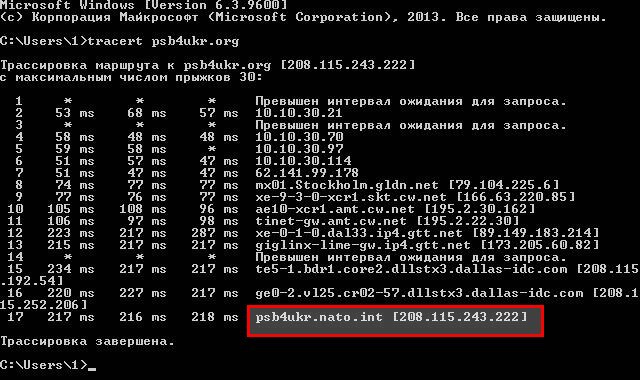
This led the pro-Russian site to declare:
Due, in all likelihood, to negligence on the part of technical support, the majority of the websites used by NATO to conduct the information war against Ukraine are now
exposed. At the same time, it is fair to suspect that specialists in
NATO had designated Buzina and Kalashnikov as security threats to
Ukraine and eliminated them, using The Peacekeeper as a tool for intimidating dissenters.
Meanwhile, the Redditors got to work and one “IT guy” explained how this spoof was done:
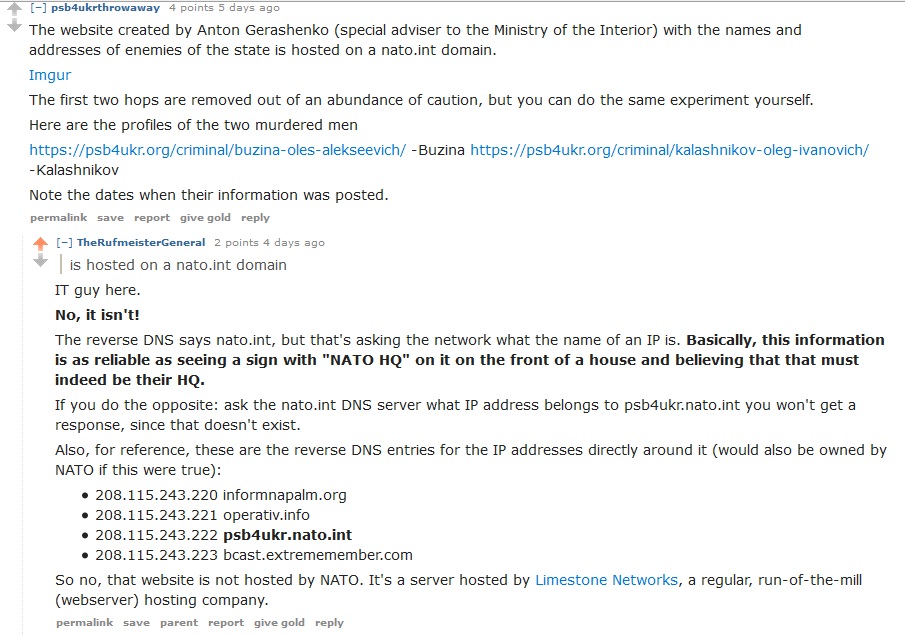
So in fact the site has nothing to do with NATO.
But meanwhile, there was another clue — the Google web cache, often extracted as the ultimate arbiter of truth in Internet sleuthing.
RT.com, the Kremlin propaganda site, had lost no time in getting in on the conspiracy act, trumpeting their “gotcha”:
To clinch her argument, Naouai said “It’s still in Google’s cache — we checked just today.”
That seemed to settle it, because as a neutral third party, so to speak, Google would be expected to show the date that a web page was created and preserve it in its cache.
While debating this, Naouai uploaded a picture of what purported to be the Google cache — except it was too blurry to see any date on the screenshot.
But we checked the same Google cache and could see for ourselves that it said “April 14.”
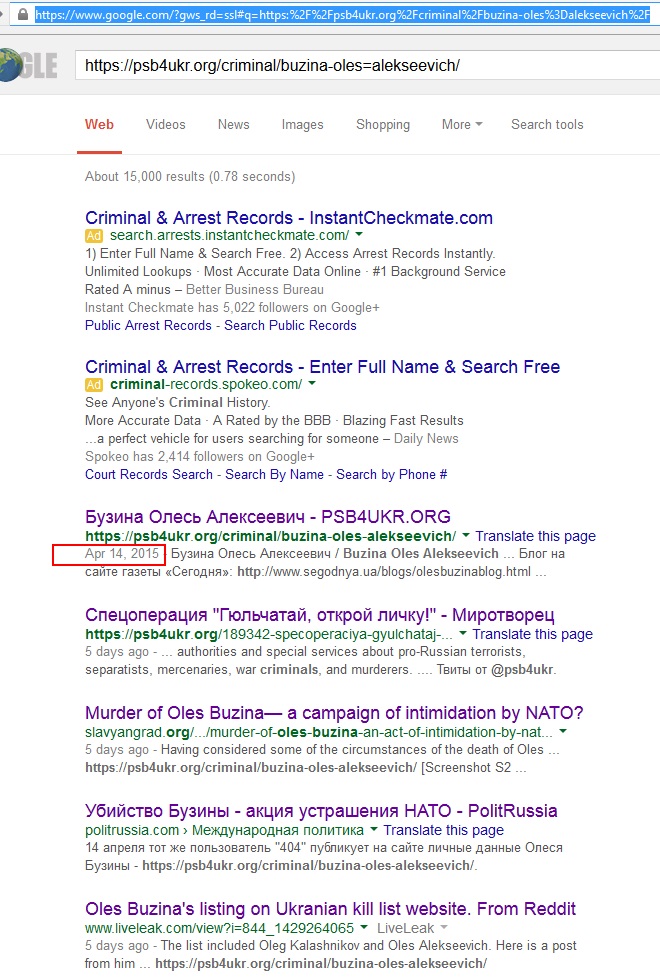
That certainly looked suspicious, regardless of the story the site managers were putting out about having faked the records.
Except…we discovered that Google cache doesn’t work the way people assume by
making a simple experiment. It turns out that if you backdate a blog
entry or web page on a content-management system, say to “April 14,” the date that
Google’s cache will show is that back date, not the actual date in real time.
So in other words, it’s easy to make a page and put any date you like on it, and Google web cache will show that date.
And for those Doubting Thomases, there is still the absolute arbiter of Internet truth: the Wayback Machine, which shows the page as not having existed before April 16.
We went a number of rounds with Naouai trying to demonstrate to her that a Google cache date didn’t signify an actual upload date if the entry was backdated, but it wasn’t getting across to her. She continued to insist that if Google cache showed a date, that must be the real date — and accuse us of making up a conspiracy.
The Peacekeeper’s site has been controversial for some; even those supportive of the Ukrainian cause are concerned about its witch-hunting nature, while others make the point that with the armed forces overwhelmed with fighting on the front and law-enforcers coping with terrorist attacks, the public has to defend itself with information against the separatist fighters, quite a few of whom came from the ranks of criminals and mafia.
The controversies around the site have made it a low-hanging fruit for Russian propaganda eager to portray Ukrainians as vindictive. Naouai also made much of exposing the site as not a “public” or “grassroots” effort but one founded by former Interior Ministry aide Anton Gerashchenko, now a member of parliament.
Except, that isn’t any secret at all as he announced it on his Facebook page and contributors know this and didn’t care. As a figure who has frequently communicated news and government policy on Facebook and given numerous interviews on Ukrainian television, he has a certain popular following and his project is perceived as a grassroots effort.
Even if the “forensic data” from Internet sleuthing had revealed that these entries really did appear before the murders, that would only be evidence that the assailant exploited the public site for this purpose, not that Peacekeeper was undertaking NATO assignments.
Meanwhile, Daisy Sindelar of Radio Liberty/Radio Free Europe has reported on another odd timing issue — Putin’s announcement of this murder a mere 22 minutes after the news hit in Ukraine, during his 4-hour call-in show, Pryamaya Liniya. Writes Sindelar:
At 1:55 p.m. Moscow time on April 16, the Ukrainian National News agency posted a bulletin announcing that journalist Oles Buzyna had been shot dead.
At 2:05, Ukrainian presidential adviser Anton Herashchenko confirmed the slaying on Facebook.
And by 2:17, Russian President Vladimir Putin was already using
Buzyna’s killing to attack Ukraine’s “democratic” values during his
annual call-in show with the Russian public.“This isn’t the first political killing we’ve seen. We’ve had an entire
series of these kinds of killings in Ukraine,” Putin said smoothly,
responding to a moderator who interrupted the live television broadcast
to announce Buzyna’s slaying. In all, just 23 minutes had passed from
the first bulletin on Buzyna’s death in Kyiv to Putin’s cursory
condemnation in Moscow.It’s a turnaround some Ukrainian officials found remarkably rapid for a president who earlier this year took more than four days to comment publicly on the far more resonant assassination of Russian opposition leader Boris Nemtsov just outside the Kremlin walls.
Ukrainian officials now allege that Buzyna’s murder was masterminded by Russian intelligence and timed to be announced during the call-in show as demonstrative of Ukrainian hostility to Russian journalists — a popular theme on Russian state TV — and instability in general.
Of course, none of this has brought the media or blogosphere any closer
to finding the real murderer or murderers of Buzyna or Kalashnikov or
others killed in a string of apparent suicides and murders in recent
weeks.
Theories of the perpetrators range from Ukrainian
ultranationalists to local political rivals to Russian intelligence —
Buzyna’s case is being discussed as similar to that of opposition leader
Boris Nemtsov because just as President Vladimir Putin said that
Nemtsov’s murder was a “provocation” meant to “destabilize” Russia, so
Ukrainian President Petro Poroshenko said exactly the same thing about
Buzyna’s murder — to the dismay of those who saw his claim therefore as
no more credible than Putin’s.
— Catherine A. Fitzpatrick